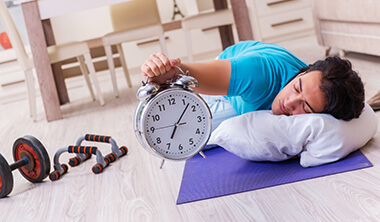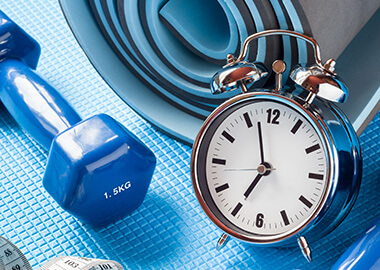Exercise For Better Sleep
This article is a great place to start if you'd like to use exercise for getting better sleep.
The average person sleeps for approximately 26 years throughout their lifetime. Sleep is fundamental. Whilst some of us can snooze with ease, others struggle.
Could exercise be the answer to restless nights? Let’s find out.

How Much Sleep Do I Need?
The amount of sleep you require depends on several factors. Your health, age and lifestyle can all affect how much sleep you require. The Sleep Foundation recommends adults aged between 26-64 should get between 7-9 hours a night. The quality of sleep also plays an important role.
Why Do I Struggle To Sleep?
According to the NHS, the main causes of insomnia are stress, anxiety or depression, noise, temperature, uncomfortable beds, alcohol, caffeine or nicotine. Recreational drugs like cocaine and ecstasy, jet lag and shift work can also affect your sleep.
Exercise For Sleep Improvement

Exercise could be a treatment for insomnia. Studies have found that in as little as four weeks your sleep can be improved with regular exercise.
A sleep exercise study from the National Library of Science USA found individuals who suffered from chronic insomnia began to fall asleep 13 minutes faster after exercising regularly. These people also stayed asleep 18 minutes longer than usual. The study compared exercise to the use of drugs in relieving insomnia. It was found to be just as effective.
What Happens To Your Body When You Exercise?
We looked at how these changes to your exercise routines can lead to a better sleep.
Exercise Changes Your Core Body Temperature
When exercising your body temperature will rise. After working out your body temperature will drop. This occurrence also takes place when we sleep. The similarity in these temperature changes may indicate to your brain that it is time to sleep.
Exercise Can Reduce Symptoms Of Stress And Anxiety
Stress and anxiety are one of the leading reasons many of us find it hard to sleep. Exercise can cause our brains to release endorphins. Endorphin release can help you to feel happier, calmer and less stressed
How To Improve Sleep Through Exercise
Don't exercise late at night
When you release endorphins from exercise you can feel more energised post-workout. So working out before trying to sleep may cause you to stay awake for longer.
Add moderate aerobic exercise to your daily routine
The National Library of Medicine USA states that moderate-intensity aerobic exercise appears to reduce pre-sleep anxiety and improve sleep in patients with chronic primary insomnia. 30 minutes brisk walking , jogging or time on a cross trainer or exercise bike would be a great place to start.
Try to identify the possible causes of your insomnia
Some of the common causes are listed in this article. Put some time aside each day to reflect. Use a journal to record your mood, caffeine, exercise and sleep patterns. You may be able to spot unhelpful patterns in your daily routine that are contributing to your struggles with sleep. By trying to address the cause in addition to adding moderate exercise to your day, you’ll create the best conditions to improve your sleep.
You should now have a good understanding of how exercise and sleep are linked. To find out more on how to get a better night’s kip, check out the 10 sleep tips provided by the NHS.
Want to know why sleep is important? Visit our benefits of sleep page.





